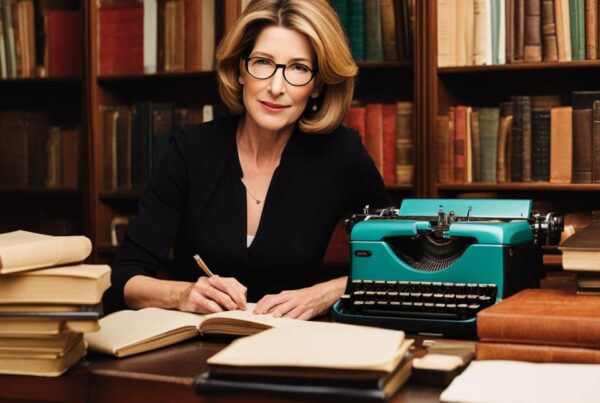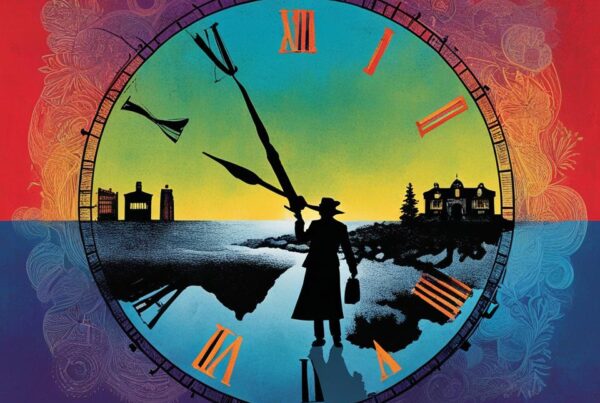In this section, we will provide a comprehensive review of the audiobook adaptation of Suzanne Collins’ popular dystopian novel, “The Hunger Games.” As the first book of a highly popular trilogy, “The Hunger Games” has been enjoyed by millions of readers worldwide. The audiobook adaptation, narrated by award-winning voice actor Carolyn McCormick, has also garnered critical acclaim. Our review will cover the narrator’s performance, production quality, pacing, and more to give you an idea of what to expect from this audiobook adaptation.
Overview of “The Hunger Games”
In “The Hunger Games,” Suzanne Collins presents a dystopian world divided into twelve districts, each ruled by a wealthy Capitol. As a punishment for a past rebellion, the Capitol holds the Hunger Games every year – a televised fight to the death among teenagers from each district. The story follows 16-year-old Katniss Everdeen, who volunteers to compete in the games to save her younger sister from being selected. Alongside her fellow tribute Peeta Mellark, Katniss navigates the brutal arena and the politics of the Capitol to survive and protect her loved ones.
The story offers a poignant critique of power, wealth, and violence, exploring themes such as poverty, sacrifice, and courage. Collins’ prose is vivid and engaging, immersing readers into the futuristic world of Panem. It has become a cultural phenomenon, inspiring a successful film franchise and various adaptations, including the audiobook we will review in this article.
Main Characters:
| Name | Description |
|---|---|
| Katniss Everdeen | A skilled hunter and survivor from District 12 who volunteers for the Hunger Games. |
| Peeta Mellark | A baker’s son from District 12 who becomes Katniss’ fellow tribute and love interest. |
| Haymitch Abernathy | A former Hunger Games winner from District 12 who becomes Katniss’ and Peeta’s mentor. |
| Effie Trinket | A flamboyant Capitol citizen who oversees the Hunger Games. |
These and numerous other characters bring life to this thrilling and emotional story.
Audiobook Narrator
One of the most critical aspects of an audiobook is the narrator’s performance. In the case of The Hunger Games, the audiobook has an experienced narrator, Carolyn McCormick. McCormick has worked on high-profile audiobooks, including the audiobook series of the Hunger Games franchise.
McCormick’s narration of The Hunger Games does an excellent job of capturing the tone and setting of the story. Her voice is clear and engaging, making it easy to listen to the audiobook for an extended period.
What sets McCormick apart from other audiobook narrators is her ability to bring the characters to life. McCormick showcases her versatility and skill by using different voices and accents to portray characters’ personalities and traits. Her narration conveys an emotional depth that makes the story come to life for the listener.
The smooth, confident narration, high-quality audio production, and McCormick’s exceptional talent as a narrator make the The Hunger Games audiobook an excellent choice for anyone looking to experience the story in a new and exciting way.
Production Quality
One of the most critical aspects of any audiobook adaptation is the production quality. With “The Hunger Games” audiobook, the production quality is top-notch, contributing to an engaging and immersive listening experience.
The sound effects used throughout the audiobook, such as the futuristic technology or the characters’ movements during the intense action scenes, add a layer of depth and realism that enhances the overall listening experience. The music, composed specifically for the audiobook, adds a haunting and ominous tone that matches the dystopian theme of the story.
Moreover, the audio clarity of the “The Hunger Games” audiobook is exceptional. The narrator’s voice is clear, and the sound production team has ensured that any sound effects or background music do not overpower the narrator’s voice, making it easy for listeners to follow the story.
In conclusion, the audiobook production quality of “The Hunger Games” is excellent and plays a crucial role in bringing the story to life in a compelling way.
Pacing and Engagement
One of the most important elements of an audiobook is its pace. “The Hunger Games” audiobook does not disappoint in this department. The narrator’s delivery is well-timed, creating a sense of tension and excitement that keeps the listener engaged throughout the story. The narration remains steady, yet it does not gloss over important moments or drag out slower scenes, making the experience overall very engaging.
The pacing also helps build momentum throughout the audiobook, leading up to the climax in a way that feels cinematic. The narrator uses pauses and changes of tone to emphasize high-stakes moments, heightening the listener’s emotional investment in the story. Overall, the pacing and engagement of “The Hunger Games” audiobook adaptation is top-notch.

Translation of Action and Emotion
One of the most significant challenges that audiobook adaptations face is translating the action-packed scenes and emotional moments from the printed book to audio format. The audiobook adaptation of “The Hunger Games” does an excellent job of capturing these critical elements and bringing them to life through sound.
The skilled audiobook narrator skillfully conveys the intense action sequences through his pacing, tone, and inflection. The listener is immediately drawn into the story, feeling the same sense of urgency and panic that the characters are experiencing. Whether it is Katniss utilizing her instincts to survive in the arena or the electrifying moment when the tributes are first chosen, these scenes are seamlessly brought to life in the audiobook version.
Moreover, the audiobook successfully conveys the emotions that characters experience, layering their spoken words with deep empathy. The narrator’s delivery perfectly captures the fear, anxiety, and excitement that the characters feel throughout the story, leading to a more immersive and affecting listening experience for the audience.
Example:
| Printed Book | Audiobook Adaptation |
|---|---|
| “I feel like I owe him something, and I hate owing people. Maybe if I had thanked him at some point, I’d be feeling less conflicted now. I thought about it a couple of times, but the opportunity never seemed to present itself. And now it never will. Because we’re going to be thrown into an arena to fight to the death. Exactly how am I supposed to work in a thank-you under those circumstances?” | “I feel like I owe him something, and I hate owing people. Maybe if I had thanked him at some point, I’d be feeling less conflicted now,” Katniss narrates. “And now it never will. Because we’re going to be thrown into an arena to fight to the death. Exactly how am I supposed to work in a thank you under those circumstances?” The desperation in her voice is palpable as she narrates the line, expressing the direness of the situation. |
| “I’ll try to remember that when I’m killing you,” he says with a grin. “I’ll make it quick.” | Peeta’s dialogue is delivered with a mixture of humor and underlying tension. As he says, “I’ll try to remember that when I’m killing you. I’ll make it quick,” the listener can sense the playfulness within his words, but there’s also an underlying chance that this may come true, increasing the excitement. |
Character Interpretation
One of the strengths of the “The Hunger Games” audiobook adaptation is how well it handles the character interpretation. The narrator’s voice and tone elevate the different characters’ personalities, making them more engaging and memorable to the listener.
Throughout the audiobook, the narrator uses voice acting to differentiate different characters, relying on different accents, intonations, and emotions. For example, Katniss is portrayed with a distinctly serious and determined tone, while Peeta has a more subdued and gentle voice. This helps listeners to better understand and differentiate the different characters, allowing them to engage more deeply with the story.
Moreover, the audiobook adaptation handles character interpretation in a way that is faithful to the original book, matching characters’ depicted personalities, and traits closely. Listeners who enjoyed the book version of “The Hunger Games” will likely appreciate the accuracy and attention to detail in the audiobook version.
In conclusion, the character interpretation in the “The Hunger Games” audiobook adaptation is top-notch, offering listeners a rich and immersive experience that captures the essence of the characters. This is a testament to the skill and talent of the audiobook narrator and production team.
Comparisons to the Printed Book
Experiencing “The Hunger Games” through the audiobook adaptation has its pros and cons. While the audiobook allows for a hands-free and convenient listening experience, it may lack the visual and imaginative aspects of reading the original printed book.
Some notable differences between the audiobook and printed book include the pacing and length of the story. The audiobook may have a more consistent and speedy pace, whereas the printed book provides more opportunity for the reader to pause and reflect on the events. Additionally, the audiobook may omit certain details or descriptions that are present in the printed book.
However, the audiobook offers a unique interpretation of the story and characters through the narrator’s voice and performance. It can also add a layer of emotion and intensity to certain scenes through the use of sound effects and music.
Overall, it depends on personal preference and the type of experience one desires. Those who enjoy a more immersive and creative experience may prefer the printed book, while those who value convenience and multi-tasking may prefer the audiobook.
Listener Experience and Enjoyment
As an audiobook listener, the experience and enjoyment of “The Hunger Games” audiobook were truly exceptional. The narrator’s voice and delivery were captivating, bringing the story to life with vivid descriptions and emotional depth. The production quality was top-notch, with clear sound and well-executed sound effects that enhanced the story’s atmosphere.
The pacing of the audiobook was spot on, with enough action and suspense to keep me engaged throughout the story. The translation of the action sequences and emotional moments was seamless, with the narrator’s voice effectively conveying the intensity of the scenes.
The character interpretation was also impressive, with distinct voices and accents that made it easy to distinguish between the different characters. Overall, the audiobook adaptation proved to be a fantastic way to experience “The Hunger Games.”
From start to finish, the audiobook left a lasting impression, truly immersing me into the world of “The Hunger Games” and its characters. The listener experience and enjoyment were unmatched, making it a must-listen for fans of the series or anyone interested in a thrilling dystopian story.
Conclusion
In conclusion, the audiobook adaptation of “The Hunger Games” by Suzanne Collins offers a thrilling and engaging listening experience. The narrator effectively captures the story’s tension and emotion, bringing the characters and their struggles to life. The production quality is excellent, with clear audio and well-placed sound effects and music. The pacing keeps listeners engaged, and the action and emotional moments are expertly translated to audio. The character interpretation is impressive, with distinct voices and personalities for each character.
While there may be some differences from the printed book, experiencing the story through audio offers a unique perspective and adds an extra layer of enjoyment to the already gripping narrative. Overall, the listener experience and enjoyment are high, leaving a lasting impression.
Based on our review, we highly recommend this audiobook adaptation to fans of the novel and those new to “The Hunger Games” world. Its expert narration, production quality, and engaging storytelling make it a must-listen for anyone seeking an exciting dystopian adventure. This audiobook review conclusion is a testament to the quality of this adaptation and its ability to capture the hearts and minds of listeners.
FAQ
Does the audiobook review cover all aspects of “The Hunger Games” adaptation?
Yes, the audiobook review provides a comprehensive analysis of different aspects of the audiobook adaptation of Suzanne Collins’ “The Hunger Games.”
What does the overview of “The Hunger Games” in Section 2 include?
The overview in Section 2 gives a brief summary of the story, setting, and main characters of “The Hunger Games” to provide context for the audiobook review.
Who is the narrator of the audiobook?
The audiobook is narrated by Elizabeth Banks, who delivers a captivating performance.
How is the production quality of the audiobook?
The audiobook has excellent production quality, featuring immersive sound effects, music, and clear audio.
Does the audiobook keep the listener engaged?
Yes, the pacing of the audiobook is engaging, ensuring that listeners stay captivated throughout the story.
Does the audiobook effectively translate the action and emotion of “The Hunger Games”?
Absolutely, the audiobook adeptly captures the intense action sequences and emotional moments of the novel.
How are the different characters interpreted in the audiobook?
The audiobook adaptation skillfully handles the voices, accents, and personalities of the various characters, bringing them to life.
How does the audiobook compare to the printed book?
In Section 8, we provide a detailed comparison between the audiobook and the original printed book, highlighting any significant differences or advantages of the audio experience.
What can listeners expect from the overall listener experience and enjoyment of the audiobook?
Listeners can expect a highly enjoyable and immersive experience with the “The Hunger Games” audiobook, which leaves a lasting impression.
What does the conclusion of the audiobook review include?
In the conclusion, we summarize our review of the audiobook adaptation of “The Hunger Games” and provide our overall thoughts and recommendations.



